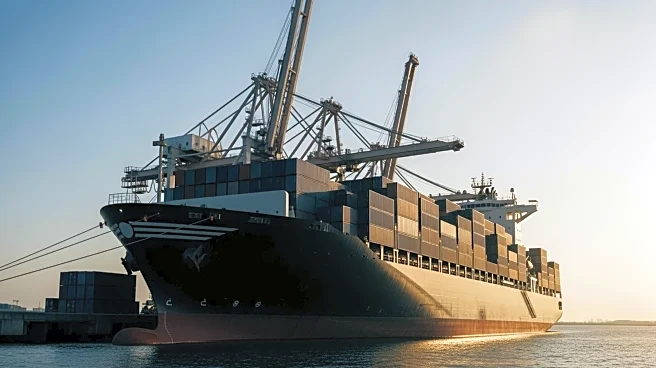What's Happening?
The Trump administration has implemented a new tariff classification that has resulted in a $34 million annual fee for Atlantic Container Line (ACL), a major U.S.-based shipping company. This change stems
from a reclassification of ACL's ships from 'container ships' to 'vehicle carriers' or 'roll-on/roll-off' vessels, despite the fact that only a small portion of their cargo consists of vehicles. The reclassification is part of an update to the rules under Section 301, which is typically used to address unfair foreign trade practices. The new rule, effective from October 14, requires each vessel to pay the Section 301 port fee five times annually, once for each U.S. port call. ACL's CEO, Andrew Abbott, expressed concern that these fees could force the company to cease its U.S.-linked operations.
Why It's Important?
This tariff reclassification has significant implications for the U.S. shipping industry, particularly for companies like ACL that operate unique hybrid vessels. The financial burden of the new fees could lead to reduced competitiveness for U.S.-based shipping firms, potentially driving them to relocate operations outside the U.S. This move could also impact the broader logistics and supply chain sectors, as increased costs may be passed on to consumers. Furthermore, the decision highlights tensions in trade policy, especially concerning the classification of vessels and the criteria used to impose tariffs, which could lead to further disputes or calls for policy revisions.
What's Next?
ACL and other affected stakeholders may seek to challenge the reclassification or lobby for policy changes to mitigate the financial impact. The company might also explore operational adjustments to minimize costs, such as altering shipping routes or cargo compositions. Additionally, there could be increased dialogue between industry representatives and government officials to address the broader implications of the tariff changes and seek a resolution that supports U.S. businesses.
Beyond the Headlines
The reclassification raises questions about the criteria used for tariff imposition and the potential for unintended consequences on domestic industries. It also underscores the complexity of international trade regulations and the need for clear, consistent policies that consider the unique characteristics of different sectors. The situation may prompt a reevaluation of how trade policies are developed and implemented, with a focus on balancing protectionist measures with the needs of domestic industries.










